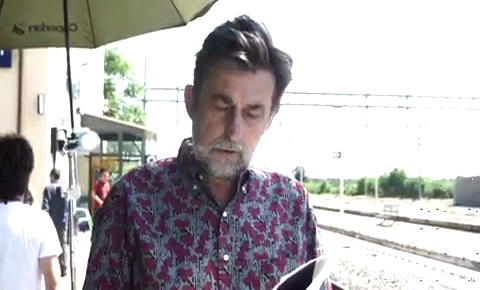Claudio Damiani was born in San Giovanni Rotondo in the
province of Foggia in 1957, though at an early age he moved
to Rome, where he still lives. In the first half of the '80s
he was among the founders of the magazine
Braci.
His first volume of
poetry,
Fraturno
(1987), and the following,
La mia casa (1994), have been collected in
La miniera (Fazi, 1997, the title taken from the new section that closes the book. Other volumes of poetry are
Eroi (Fazi, 2000),
Attorno al fuoco (Avagliano,
2006),
Sognando Li Po
(Marietti, 2008),
Poesie (Fazi,
2010),
Il fico sulla fortezza (Fazi, 2012) and
Cieli celesti
(Fazi 2016). A passionate scholar of poetry,
especially the poetic works of Horace, he has also written
Il rapimento di Proserpina for the theatre.
"The reference to a defined and circumscribed place in which
alone his poems seem to find the intimacy and emotional
stability necessary to their existence is characteristic of
Damiani. But if the Horatian scenes of Sabina (the Bandusian
spring, Lake Fraturno, a house, a few trees and animals)
refer to a type of modern Arcadia, their specific quality is
above all to approach a voice that is internal and literally
poetic, refound and guarded iike an unexpected and precious
gift. Between the poet and the presences of his chosen
piace, which are, not coincidentally, anthropomorphic
figures, a type of loving dialogue develops, without
hierarchy, which only friendship and mutual solicitude can
justify and guarantee. This leads to an extreme
simplification of expression, distancing the poetical
discourse from any kind of intellectuai or reflective
complexity, as well as from literary references. The result
is a simple language, playing on child-like innocence and
surprise, underlining the authenticity of the few, but vital,
feelings and situations".(Roberto Galaverni,
Contemporary Italian Poets,
Modern Poetry in translation no. 15, 1999).
How lovely that this time (Translated by John Satriano)
Three Poems translated by Emanuel di Pasquale
Poems translated by John Satriano
If time could glide with no wounds (translated by Luigi Fontanella)
Mount Soratte, it’s evening (Translated by Elena Buia and Andrew Rutt)
Anio Novus (Translated by Martin Bennett)
Bibliography
Franco Buffoni, Italian Contemporary Poets, Fuis, 2016
New Italian Poetry, An Anthology, Edited by A. Moscè, Gradiva Publications, Stony Brook, New York, 2006, Tr. Emanuel Di Pasquale, pp. 204-209
Journal of Italian Translation, Vol. I, No. 2, 2006, Editor L. Bonaffini, Tr. Luigi Fontanella, pp. 168-169
Modern Poetry in Translation No. 15, Contemporary Italian Poets, King’s College London, 1999, Tr. John Satriano, pp. 31-34
